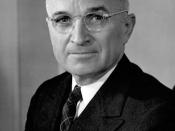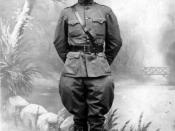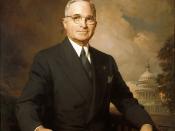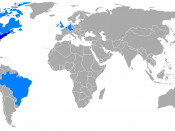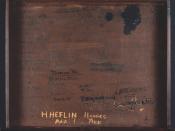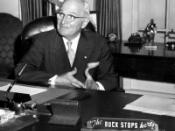Harry S. Truman was born in Lamar, Missouri on May 8, 1884, the son of John Anderson Truman and Martha Ellen Truman. His family included Vivian, and Mary Jane. His family had moved several times during Truman's childhood. The family moved to a farm in Grandview in 1887. Then in 1890 was another move to Independence, and again in 1902 to Kansas City. Truman attended public schools in Independence and graduated from high school in 1901. After leaving school, he worked for a short time as a timekeeper for a railroad construction contractor, then as a clerk in two Kansas City banks. In 1906 he returned to Grandview to help his father on the farm. He then continued working as a farmer. Truman served in the Missouri National Guard from 1905 to 1911, during WWI, in 1917, he helped organize the 2nd Regiment of Missouri Field Artillery, which was called into service as the 129th Field Artillery and sent to France.
During WWI, Truman was promoted to Captain. He and his unit fought in the Vosges, Saint Mihiel and Meuse-Argonne campaigns. After the war Truman joined the reserves, eventually gaining the rank of colonel. Harry S. Truman married Bess Wallace on 28 June 1919. On February 17, 1924, they had their only child, Mary Margaret. Truman was elected to be one of three judges of the Jackson County Court in 1922. He was defeated for reelection in 1924, but won election as presiding judge in the Jackson County Court in 1926. He won reelection in 1930. Truman was elected to the United States Senate in 1934. After his reelection to the United States senate in 1940, Truman gained a position as chairman of the Senate Special Committee in order to investigate the National Defense Program. Truman was nominated to run for Vice President with President Franklin D. Roosevelt in July 1944. On 20 January 1945, he took the vice-presidential oath. And after President Roosevelt's unexpected death, eighty-two days later on April 12, 1945, he was sworn in as the thirty-third President of the United States of America . Then in 1948, the Democrats nominated him to run for president against the Republican Thomas E. Dewey, Progressive Henry Wallace, and Dixicrat Storm Thurmond. Truman won the election with 303 of the possible 531 electoral votes and 49% of the popular vote. Truman did not seek reelection in 1952. He then retired to Independence, Missouri. He later died on December 26, 1972 .
During Harry S. TrumanÃÂs presidency, a number of significant cultural, economic, and political events took place. Circa 1940ÃÂs, was the dawning of the nuclear age. It was started with either the development or dropping of the first atomic bomb. This event was a direct cause from Harry S. Truman. The first attack with an atomic bomb took place on August 6, 1945 in Hiroshima during TrumanÃÂs presidency . American and World culture changed after the debut of the A-bomb. Atomic bombs can now be found in books, film, art, music, video games, ect. WWII ended in Europe on May 8, 1945 known as V - E Day and Japan surrendered on August 15, 1945 known as V ÃÂ J day. Economic results of the end to WWII included an end to the Great Depression. This was possible due to the conscription of all able bodied men to the war effort and the U.S. government instituting deficit spending. This approach lead to an immediate stop to the Great Depression . TrumanÃÂs presidency marked the beginning of the United Nations. It was started in the early months of 1945 in order to replace the League of Nations. The United Nations key goals were to prevent wars and to provide a dialogue platform. Truman was also the first president to address the nation on TV. He addressed the possibility of a wheat famine as presented by the Citizens Food Committee. "The nations of Western Europe will soon be scraping the bottom of the food barrelÃÂ said Truman in his address. The solution to the near future famine was a rationing of wheat by ÃÂOne: Use no meat on Tuesdays. Two: Use no poultry or eggs on Thursdays. Three: Save a slice of bread every day. Four: Public eating places will serve bread and butter only on requestÃÂ. Because of TrumanÃÂs address, a Western European Famine was adverted during the winter of 1947 . On March 5, 1946, Winston Churchill delivered his "Iron Curtain" speech at Westminster College in Fulton, Missouri. The ÃÂIron CurtainÃÂ was a term to describe the boundary that separated the Warsaw Pact countries from the NATO countries from 1945 until the end of the Cold War in 1991. The Iron Curtain was both a physical and an ideological division that represented the way Europe was viewed after WWII. On the East side of the Iron Curtain were the countries that were connected to or influenced by the former Soviet Union. This included East Germany, Czechoslovakia, Poland, Hungary, Bulgaria, and Romania. Albania was on the east side of the ÃÂIron CurtainÃÂ until its alignment with China in 1960 . On April 15, 1947, Jackie Robinson plays his first game with the Brooklyn Dodgers and integrates major league baseball. He was named Rookie of the Year and was the Most Valuable Player in the National League in 1949. Robinson played for the Dodgers for his entire 10-year major league career and was with the team during the 1955 World Series win. In 1962, he became the first black player inducted into the Baseball Hall of Fame . Jackie Robinson became an inspiration to the civil rights movement and a cultural symbol.
Many key events in legislature also occurred during Truman's presidency such as the Employment act. The Employment act of 1946 consisted of three main elements. ÃÂFirst, it proclaimed the right of all Americans ÃÂ"able to work and seeking work"ÃÂ to regular, full-time employment. Second, it provided a Keynesian planning mechanism, the National Production and Employment Budget, to identify any pending deficiencies in expenditures and investment that might stand in the way of full employment. Third, the bill directed the federal government to address such shortfalls by encouraging private investment and if necessary by federal spending as a last resortÃÂ . On March 12, 1947, President Truman delivered the ÃÂTruman DoctrineÃÂ to congress asking for a $400 million appropriation to fight the spread of Communism in Greece and Turkey. The United States gave aid to Greece and Turkey for both political and military reasons; shortly after Great Britain stopped its economic aid to both countries in 1947 . United States Executive Order 9835 was signed by Harry S. Truman on March 21, 1947. It created the first loyalty program in the U.S. It was created to root out communist influence within the departments of the U.S. federal government. Truman, on 20 June 1947, vetoes the Taft-Hartley act. Also called the Labor-Management Relations act, it is a federal law that monitors the activities and power of labor unions. Truman vetoed this act because he deemed it to ÃÂconflict with our democratic societyÃÂ. However, congress overrides his veto of the act on June 20, 1947 . On July 26, 1947, Truman's National Security Act passes Congress, creating the National Security Council, the Central Intelligence Agency, the Department of Defense, and the National Security Resources Board . The ÃÂMarshal PlanÃÂ was passed by congress on April 2, 1948. The Marshal Plan was the primary program to help reconstruct the economy of Western European countries and to repel the threat of communism. About thirteen billion dollars USD in technical and economic assistance were given to help aid the Western European countries . On September 22, 1950, President Truman vetoed the International Security act. The International Security act, also called the McCarran act, requires the registration of Communist organizations with the United States Attorney General and in addition established the Subversive Activities Control Board to investigate persons suspected of engaging in fascist or communist activities. Members of these groups could not become citizens and sometimes were prevented from entering or leaving the country .
Bibliography1 The Harry S. Truman Library and Museum, Harry S. Truman, http://www.trumanlibrary.org/hst-bio.htm, 22 November 20092 Martin Kelly, Harry S Truman - Thirty-Third President of the United States, http://americanhistory.about.com/od/harrystruman/p/ptruman.htm, 22 November 20093The atomic bombing of Hiroshima, http://www.cfo.doe.gov/me70/manhattan/hiroshima.htm, 22 November 20094 Depression and WWII, http://www.americaslibrary.gov/cgi-bin/page.cgi/jb/wwii, 22 November 20095 J.C. Grant, President Harry S. Truman: Recounting the First-Ever Television Address, http://www.associatedcontent.com/article/2251087/president_harry_s_truman_recounting_pg2_pg2.html?cat=37, 5 October 2009, 22 November 20096 What was the Iron Curtain?, http://www.wisegeek.com/what-was-the-iron-curtain.htm, 22 November 20097 Jackie Robinson and the Integration of Baseball, http://www.npr.org/programs/morning/features/2002/oct/robinson/, 10 October 2002, 22 November 20098 Employment Act of 1946, http://www.answers.com/topic/employment-act-of-1946, 22 November 20099 The Truman Doctrine, 1947, http://www.state.gov/r/pa/ho/time/cwr/82210.htm, 22 November 200910 The Columbia Electronic Encyclopedia, Taft-Hartley Labor Act, http://www.infoplease.com/ce6/bus/A0847620.html, 22 November 200911 U.S. department of state, http://www.state.gov/r/pa/ho/time/cwr/17603.htm, 22 November 200912 The Columbia Electronic Encyclopedia, Marshall Plan, http://www.infoplease.com/ce6/history/A0831964.html, 22 November 200913 McCarran Internal Security Act, http://law.jrank.org/pages/8498/McCarran-Internal-Security-Act.html, 22 November 2009âÂÂ
